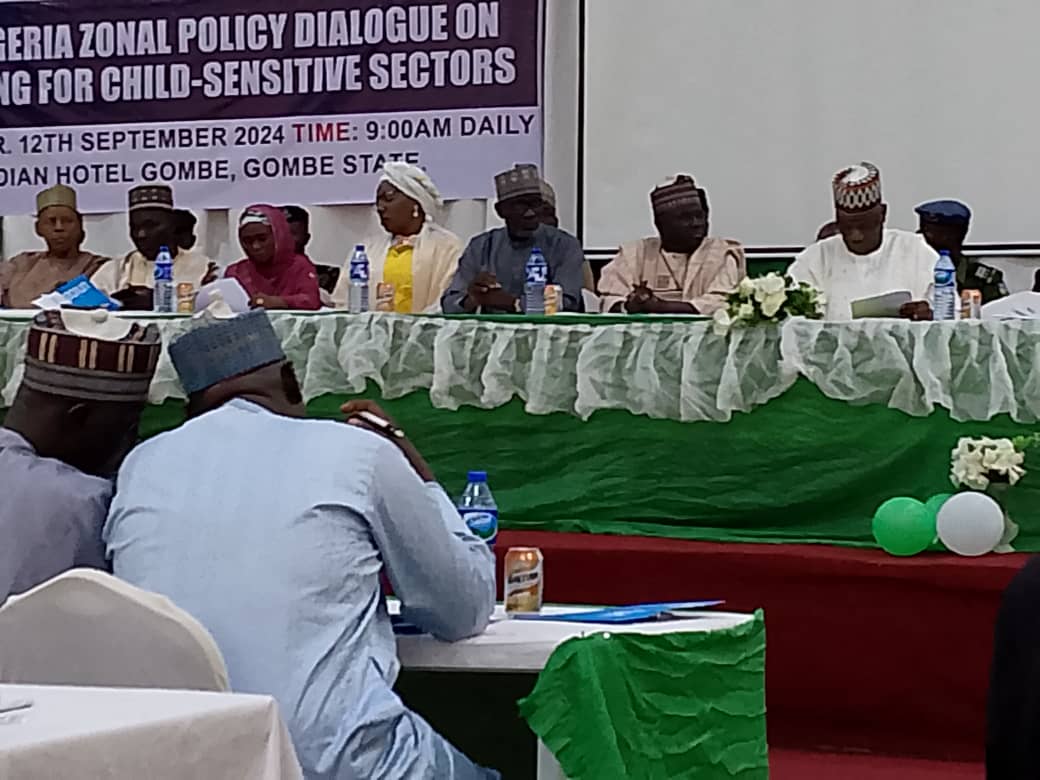News
North East Policy Makers Pledge Improve Budget For Child Sensitive Sectors

|
Getting your Trinity Audio player ready...
|
North East policy makers pledge improve budget for child sensitive sectors.
From Umar Dankano,Yola
The United Nations Children’s Education Fund, UNICEF has urge Federal and state governments to ensure implementation of budget financing for children.
Officer in charge of Unicef Bauchi field office, Mohammad Kamfut disclosed the development during a two day policy makers engagement on the North East states strategic policy dialogue on social budgeting for child sensitive sectors in Nigeria held in Gombe state.
Represented by the Unicef Social Policy Specialist, Dr. Yusuf Auta,Kamfut said in the last three decades, global efforts have consistently aimed to honor commitments to children which includes taking necessary measures to safeguard and advance their rights, ensuring they have resources to survive,develop, and thrive as outlined in the convention on the rights of the child.
Kamfut decried that despite efforts to address poverty globally, children have been overlooked in poverty reduction stressing that the 2020 report on Multi-dimentional child poverty Analysis supported by Unicef Nigeria indicated that over 47 million children representing 47.4% of Nigerian children,live in households with incomes below the national poverty line of N137.430 per year (based on the 2019 exchange rate).
While declaring the policy dialogue open ,the Gombe state Deputy Governor,Jatau Manassah Daniel said basically Social Budgeting Child Sensitive Sectors is the planning, mobilization, allocation of resources, implementing and monitoring the utilization of these resources to ensure that children with or without specials needs are not denied their fundamental rights to education, health care, social protection, safety both physical and social-hunger, eating balanced diet to avoid stunted growth, and other unpleasant diseases associated with malnutrition.
Daniel applauded the Unicef for calling for the policy dialogue explaining that any concerned individuals, scholars, international bodies have shown discomfort with the trend of things and feel that children have been always short changed or virtually everything we undertake which must not only be addressed but to reverse it.
Daniel advocated that a budget should comply with 50/20/30 rule. In essence your income should be shared in the proportion of 50% for your needs, 20% savings and 30% for your wants noting
the challenge is actually on the leaders on account of the fact the children are not in a position to prepare budget for themselves.
He therefore charged the policy makers to ensure that the desired outcome is achieved through proper comprehensive acceptable and political will support to the SOCIAL BUDGETING for child sensitive sectors in our states.
“One favourable wind on our side is that this dialogue came at the time we are at verge of preparing our budgets in the various states, for the forthcoming year 2025 as I wish this dialogue comes up with relevant, responsive, implementable and adaptable solutions that will stand the test of time, integrity, transparency and any sort of sentiments”.The Deputy Governor maintained.
In the communique issued at the end of the two day policy dialogue involving 120 participants from the six (6) states in the zone (North East), stakeholders unanimously agreed to increase the budgetary allocation for children and women protection, nutrition and WASH.
Policy makers called on governments to address issues of high mortality rate and out of school children in the zone which was observed to be large scale and growing with many children falling behind developmental early in life.
The dialogue also appeal to government for establish a directorates or Agencies for out of school children and scaling up of foundational literacy and numeracy and to strengthen multi_sectoral buy-in and coordination in social service delivery outcomes for women and children.
Our Correspondent reported that the program was attended by Commissioner s of budget and planning,Commissioners of education and their permanent secretaries, Directors and other se








